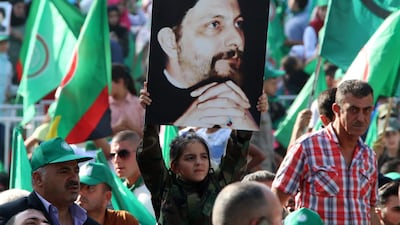The visit of a Libyan delegation to Beirut this week marks an “important step” in the disappearance of Imam Musa Al Sadr, a prominent Lebanese Shiite cleric who went missing during a trip to Libya in 1978, a Lebanese judicial source told The National.
The two-day visit aimed to resume talks with Lebanese officials regarding a deal struck between the two countries in 2014, in which Libyan authorities committed to enhancing co-operation and facilitating access for Lebanese authorities to the case.
This includes the possibility for Lebanese judiciary to propose additional investigations as a party to the case opened in Libya.
“This is the first time in years that the Libyan side is showing serious signs of co-operation regarding Mr Al Sadr's case,” the source said.
The delegation, who met with Lebanon's Ministry of Justice and a judge leading a committee investigating Mr Al Sadr's disappearance, also addressed, as a separate issue, the case of late Libyan leader Muammar Qaddafi's son, who has been detained in Lebanon for years without trial.
Mr Al Sadr, a charismatic and esteemed Shiite figure, was seen for most Lebanese as one of the few leaders who promoted inter-religious dialogue in the decade before Lebanon's devastating civil war.
The fate of the cleric, which remains unknown, has been a long-standing contentious issue between Libya and Lebanon. The 2014 deal between the two countries has remained dormant until now.
“None of the promises made in the agreement has been kept,” the judicial source said, emphasising that the last serious attempt to implement the deal, which dates back to March 2016, has not yet yielded any results.
Exchanges between the two judiciaries began to resume in 2023.
The judicial source said that the current talks were first steps to resume co-operation over the case.
“We have to wait for the application of the memorandum's clauses. This is to be continued,” the source added, without specifying what, if anything, has been officially agreed on so far.
In 1978, Mr Al Sadr along with an aide and a journalist flew to Libya to meet local officials. He was never seen again. Every year since his disappearance, the Amal Movement, which he founded, has organised mass protests as a tribute to the cleric's memory.
According to Qaddafi's version of events, Mr Al Sadr left for Italy but never arrived, while Lebanon accused him of being responsible for his disappearance.
Two 'separate' cases
The delegation and the Lebanese officials also discussed the fate of Hannibal Qaddafi, who has been held in Lebanon since 2015 after he was kidnapped by Lebanese militants demanding information about Mr Al Sadr.
He was then detained by Lebanese judiciary, which charged him of withholding information regarding the imam's disappearance.
“This is separate from Mr Al Sadr's case,” the source said, adding that this is not an “exchange", which would involve the release of Mr Qaddafi in exchange for the application of the deal.
In August, Libya’s judicial authorities formally requested that Lebanon release Mr Qaddafi due to his deteriorating health – he was admitted to hospital several times after he started a hunger strike to protest his eight-year detention.
This month, Human Rights Watch called for the release of Mr Qaddafi. The rights group said he was only two years old at the time of the imam's disappearance and held no senior position in Libya as an adult.
Mr Qaddafi's “apparent arbitrary detention on spurious charges after spending eight years in pretrial detention makes a mockery of Lebanon's already strained judicial system", Hanan Salah, HRW's associate Middle East and North Africa director, said in a statement.


